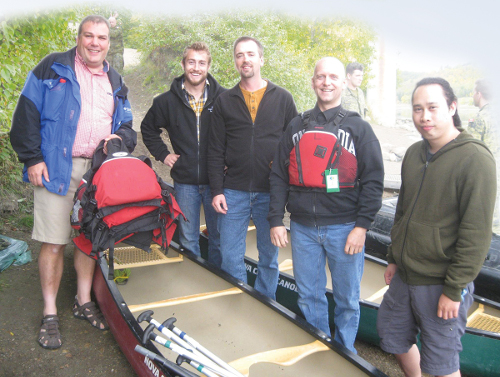Last January, my mother ended her 13-year battle with cancer. Although she had experienced a gradual decline, and we knew the hope that Jesus gives us at the graveside, her family felt deep grief. At the same time, we were blessed with the love and care of many people who had supported us through that time.
I was especially touched because Concordia Lutheran Seminary, where I serve as dean of student life, closed for the afternoon so that faculty, staff, and students could attend the funeral. How good it was to be surrounded by my seminary family and to be hugged by them after the service! My professional charge is care of the students, but in the weeks after the funeral, I often found that the students cared for me.
This experience highlights one of the greatest strengths of a smaller seminary: the opportunity to grow together spiritually in a tight community. Here, as at all theological schools, formation for ministry is not merely learning to interpret biblical texts in their original language or articulating doctrinal propositions. Those skills are vital, but ministerial education is much more — it’s the process of being molded into a Christian leader. At some places, students might be able to hide in the crowd, but in a small school, that formation is highly personal.
 |
| Team-building events are part of the first-year student orientation at Concordia. Here, Jonathan Kraemer (pictured at far left) and new students prepare to canoe on the North Saskatchewan River. |
The scriptures themselves are all about relationships — God’s relationship with us and our own relationships with one another. And we find that faculty, staff, and students feel a unity in Christ, despite all the things that might otherwise divide us. Some publish in prestigious journals, others study in the wee hours of the night, and still others take care of administrative details or vacuum the halls, but we are all one in Christ.
Here at Concordia, lunchtime is a family meal. Staff, students, and faculty eat together, sometimes having serious conversations, and at other times sharing a good laugh. During chapel, it’s not unusual to have early all students, staff, and faculty worshiping together. And afterwards, the nervous student who just led his first service, and those who are going out into new ministry, are surrounded by encouragers who are not afraid to also offer constructive criticism.
In any community made up of saints and sinners, tensions arise. People disagree about theology and life, and sometimes people are selfish or careless. At Concordia, we are intentional about taking the opportunity to confess wrongs and seek forgiveness. We learn how to discuss differences respectfully and come to an understanding under the cross of Christ.
At smaller institutions like ours, governing boards can also celebrate and support this personal aspect of spiritual formation. Our board of regents schedules most meetings when classes are in session and joins the community for chapel and for lunch. These actions communicate to the students that the board members do not see themselves as above or separate, but rather as part of the community. Praying for students, faculty, and staff is another way that the board cares for the family of God in our particular location.
A smaller seminary needs faculty who are not only competent scholars and effective teachers, but who appreciate opportunities for formation both inside and outside of the classroom. When there are faculty vacancies to fill, it’s our practice that faculty, staff, and students meet each candidate in order to discern whether there is an appropriate fit.
Some people look at smaller schools and see only challenges, but I am grateful that our board, along with everyone on campus, sees so much more than the fiscal or legal challenges that we face. Instead, they recognize that a vibrant, caring seminary family is an effective place to form Christian servants as leaders who are prepared to go out into the church with knowledge, conviction, and compassion.